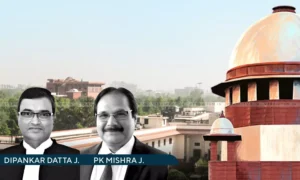The Supreme Court has ruled that under Order XXII Rule 10A of the Civil Procedure Code (CPC), it is the responsibility of the pleader to clearly inform the court about the death of a party involved in a suit.
The Supreme Court has ruled that Order XXII Rule 10-A of the Code of Civil Procedure requires the clear communication of a party’s death. The Court found that the Allahabad High Court’s failure to adhere to this rule led to the dismissal of the appeal due to abatement. The Court overturned the abatement orders and allowed the substitution request.
A bench comprising Justice Dipankar Datta and Justice Prashant Kumar Mishra stated, “Since the information regarding the death of Rooprani was not communicated fully in line with Rule 10-A, the information provided through Anil Kumar’s application cannot be used against Om Prakash. Had Om Prakash been properly notified by the High Court according to Rule 10-A and failed to file a substitution application, he would have been barred from claiming ignorance, and we would have ruled differently. Since this was not the case, the abatement of the second appeal should be set aside.”
Senior Advocates Thomas P. Joseph and Shekar Devesa represented the Appellants, while Senior Advocate Raghenth Basant appeared for the Respondent.
Brief Facts: During the pendency of the appeals, both the original plaintiffs and the defendant passed away. Although some information about the death of a party was provided via an affidavit in one of the appeals, the High Court did not take formal steps to notify the opposing party in accordance with Order XXII Rule 10A of the CPC. As a result, the High Court dismissed the appeals on the grounds of abatement, due to the legal heirs failing to file substitution applications within the required time. The appeals were subsequently challenged before the Supreme Court, which considered whether the High Court’s failure to issue notice under Rule 10A warranted the cancellation of the abatement orders.
Court’s Reasoning The Supreme Court stated that Rule 10A casts a duty upon a pleader appearing for a party to the suit to intimate the Court about the death of such party. It further provides that once the court is informed by the pleader of a party that he is no more, the Court “shall” notify the opposing party of the death. “A straightforward interpretation of this rule would suggest that the court’s obligation to issue notice to the other party is indeed mandatory,” it held. Nonetheless, this obligation may not arise in all circumstances and one notable exception could be, as the Court explained, “when the information regarding the party’s death is conveyed to the court in the presence of the opposing party’s pleader or is documented by the court in the order sheet. In such cases, if the pleader of the concerned party (and consequently the party itself) has already been notified, issuing a further notice from the court would not serve any substantial purpose other than being an exercise by way of abundant caution. Therefore, in the aforementioned scenario, the absence of a notice from the court would not imply a failure to comply with Rule 10A, suggesting that it is not always mandatory.”
The Court referred to its decision in Perumon Bhagvathy Devaswom v. Bhargavi Amma (2008), wherein it was held that “Rule 10-A of Order 22 casts a duty on the counsel for the respondent to inform the court about the death of such respondent whenever he comes to know about it. When the death is reported and recorded in the order-sheet/proceedings and the appellant is notified, the appellant has knowledge of the death and there is a duty on the part of the appellant to take steps to bring the legal representative of the deceased on record, in place of the deceased. The need for diligence commences from the date of such knowledge. If the appellant pleads ignorance even after the court notifies him about the death of the respondent that may be an indication of negligence or want of diligence.”
The Bench emphasised that it is implicit that the information relating to the death of a party must be conveyed in a “straightforward and unambiguous manner” to enable the parties to take steps and apply for substitution. “No advantage should be allowed to be derived if such death is, by clever drafting, sought to be disclosed in an obscure corner of an application seeking to bring to the notice of the court an alleged subsequent development resulting in violation of a court’s order,” it held. The Court explained, “Having held that the manner of conveying information of the death of Rooprani was not wholly in accordance with Rule 10-A, information through the application of Anil Kumar cannot operate adversely against Om Prakash. Had Om Prakash been noticed by the High Court in due compliance with Rule 10-A, yet, did not file an application for substitution, he would be estopped from pleading ignorance and we would have been inclined to hold otherwise. This not being the case, the abatement of the second appeal ought to be set aside.” Consequently, the Court ordered that “the impugned orders stand set aside. The abatement of the second appeal is also set aside. Resultantly, the prayer for substitution stands granted.” Accordingly, the Supreme Court allowed the Appeal. Cause Title: Om Prakash Gupta Alias Lalloowa (Now Deceased) & Ors. v. Satish Chandra (Now Deceased) [Neutral Citation: 2025 INSC 183] Appearance: Appellants: Senior Advocates Thomas P Joseph and Shekar Devesa; AOR A Velan; Advocates Navpreet Kaur, Rudraksh Gupta, Nilay Rai and Prince Singh Respondent: Senior Advocate Raghenth Basant; AOR Abhigya Kushwah; Advocates Nishant Anand, Gunjan Bansal Anand, Anushasit Arya, Hima Bhardwaj, Shakib, Sandeep Sury and Sunita Singh

